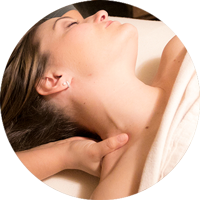The thyroid gland is one of the most important parts of your endocrine system, producing hormones that regulate practically every metabolic process in your body. That means any type of thyroid disorder can have wide-ranging impacts on your overall health, and it’s important to understand some of the most common thyroid disorder signs and symptoms so you can receive effective treatment. Although there is the potential for serious illness as a result of thyroid disorder, the majority of conditions can be managed with proper care.
What Is Thyroid Disorder?
The most common types of thyroid disorders fall into two categories: Hyperthyroidism refers to disorders in which the thyroid produces too many hormones, while hypothyroidism refers to insufficient hormone production. Depending on which disorder a person has, he or she may experience thyroid disorder symptoms ranging from excessive sweating and rapid heartbeat to fatigue and muscle aches. Because the hormones secreted by the thyroid gland play such an important role in regulating so many of the body’s essential processes, the effects of thyroid disorder on the body can be wildly different from person to person.
Thyroid Disorder Signs and Symptoms
It can be difficult for someone to realize he or she may have thyroid disorder, because thyroid disorder’s symptoms are so varied and may seem innocuous at first. However, individuals who experience any of these symptoms for extended periods should consult a doctor as soon as possible.
Some of the most common thyroid disorder symptoms related to hyperthyroidism include:
- Rapid heartbeat
- Sudden weight loss
- Nervousness or anxiety
- Difficulty sleeping
- Excessive sweating
- Increased sensitivity to heat
- Changes in menstrual cycle
- Thin skin
- Swollen thyroid gland (goiter)
- Dry, brittle hair
- Trembling hands or fingers
Some of the most common thyroid disorder signs related to hypothyroidism include:
- Puffy face
- Sudden weight gain
- Muscle weakness
- Depression
- Slowed heart rate
- Elevated cholesterol levels
- Stiff joints or joint pain
- Memory problems
- Dry skin
- Increased sensitivity to cold
- Fatigue
- Enlarged thyroid gland (goiter)
- Muscle aches
If left untreated, hypothyroidism and hyperthyroidism can lead to a progression of symptoms that can make life more difficult for someone with thyroid disorder. In rare cases, hypothyroidism can develop into myxedema, a life-threatening condition characterized by extremely low blood pressure and decreased body temperature. In extreme cases, hypothyroidism or hyperthyroidism can increase the risk of thyroid cancer.
Thyroid Disorder Causes and Risk Factors
Thyroid disorder’s causes and the risk factors that make someone more susceptible to the disease are varied, but they are important to understand in order to diagnose the condition. Thyroid disorder causes linked to hypothyroidism include toxic adenomas, which are thyroid nodules that develop and secrete excessive hormones. Hyperthyroidism also can be brought about by thyroiditis, an inflammation of the thyroid that causes the gland to secrete an excessive amount of hormones. One of the most common causes of hyperthyroidism is Graves’ disease, an autoimmune condition that attacks the thyroid, causing it to overproduce hormones.
Among the most common thyroid disorder causes linked to hypothyroidism include lithium use as well as exposure to excessive amounts of medications containing iodide. People who have had a portion of their thyroid removed due to surgery also have a higher risk of developing hypothyroidism. Hashimoto’s thyroiditis is an autoimmune disorder that attacks the thyroid tissue and disrupts production of thyroid hormones.
Although thyroid disorders can strike anyone at any time, there are some risk factors that indicate someone may be more likely to develop a thyroid disorder than others. For example, women over age 60 have a higher incidence of thyroid disorders. People with a family history of thyroid disorders also have a higher risk. Women have a higher risk of developing a thyroid disorder within six months of becoming pregnant or giving birth. Certain medical procedures — including thyroid surgery and radiation therapy in the neck or chest area — can increase the risk for thyroid disorders, as well.
Diagnosing Thyroid Disorders
When a doctor suspects that a patient may have thyroid disorder, the doctor will first check the patient’s medical history for signs of thyroid disorder symptoms or family history of thyroid disease. Next, the doctor may order a blood test to check the patient’s levels of thyroid-stimulating hormones (TSH). Although in the past, blood tests were not always an accurate means of diagnosing thyroid disorders, today’s modern TSH tests are much more effective at diagnosing thyroid disorders. If the patient’s TSH levels suggest thyroid disorder, the doctor may request a thyroid scan or a radioactive iodine uptake test if hyperthyroidism is suspected.
Thyroid Disorder Treatments
Because the symptoms can be so different, there are many thyroid disorder treatments that can be effective at managing them. Some of the most common types of thyroid disorder treatments include:
- Medication: Synthetic hormones or hormone inhibitors have been shown to be effective at controlling the symptoms of hypothyroidism or hyperthyroidism, respectively. However, these and other medications often come with side effects. Beta blockers don’t treat the thyroid but can reduce rapid heartbeat and high blood pressure in some patients.
- Surgery: In the case of hyperthyroidism, doctors may recommend a partial thyroidectomy in rare cases. This procedure removes a portion of the gland to reduce the overproduction of hormones. This option requires patients to take synthetic hormones for the rest of their lives and carries with it the risk of damage to the vocal cords and the glands that regulate calcium levels in the blood, however.
- Natural therapies: Although these treatment options cannot address every symptom of thyroid disorder, natural therapies such as massage, acupuncture, and chiropractic care can help some people with the condition ease certain symptoms such as stiff muscles and joint pain. A functional medicine program and other lifestyle changes can help some people improve their overall health and ease some of the symptoms of their thyroid disorders, as well. The benefits of these therapies include fewer side effects than over-the-counter medications and no risk of damage to other parts of the body.
Schedule
Please fill out the form to request an appointment at our health and wellness center for the service and location of your preference. We try to get back to all requests as quickly as possible. If you need immediate assistance, please call 773-598-4387.
Your safety comes first: we are operating with heightened safety measures in our clinics and offer telemedicine for those unable to visit in person.






